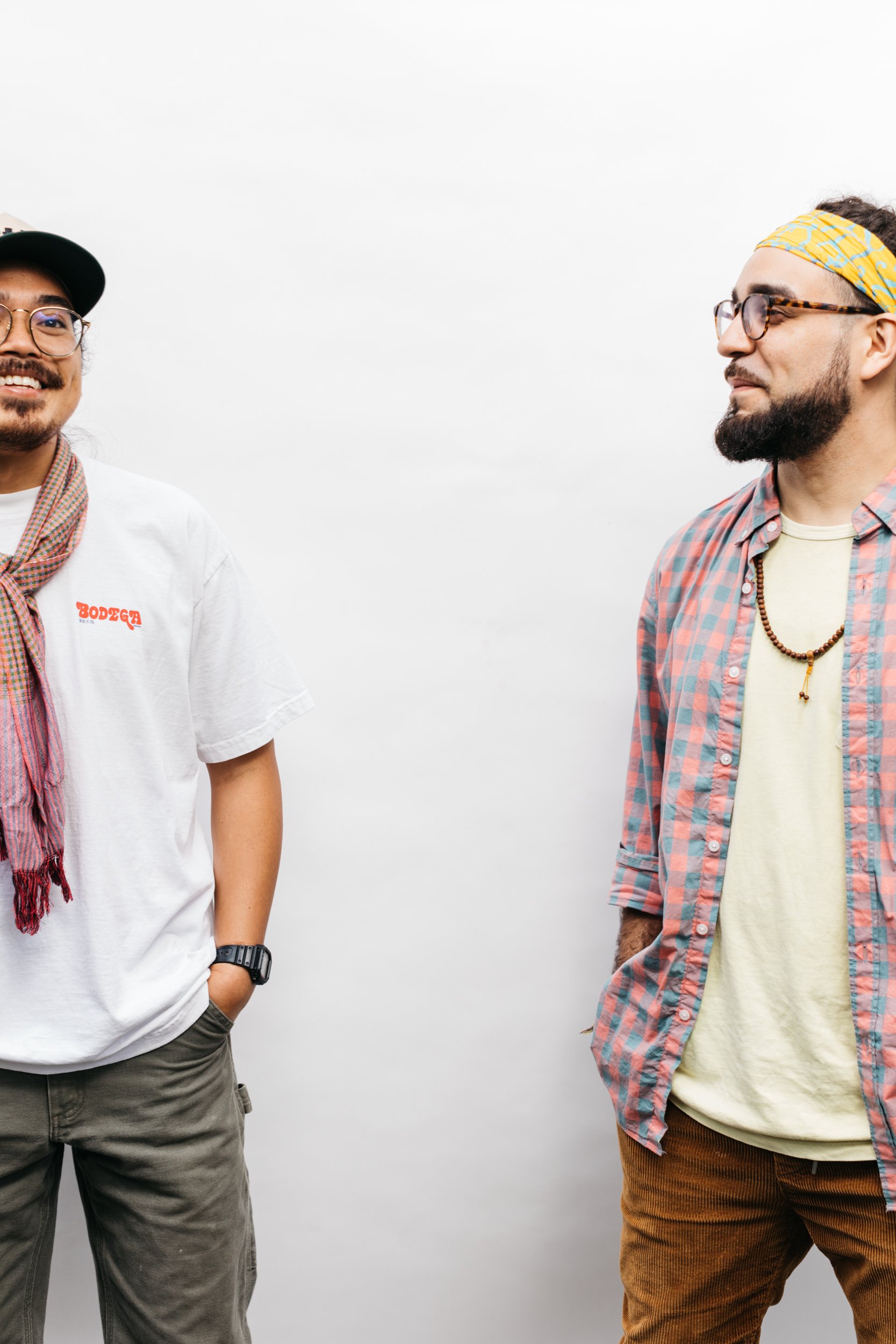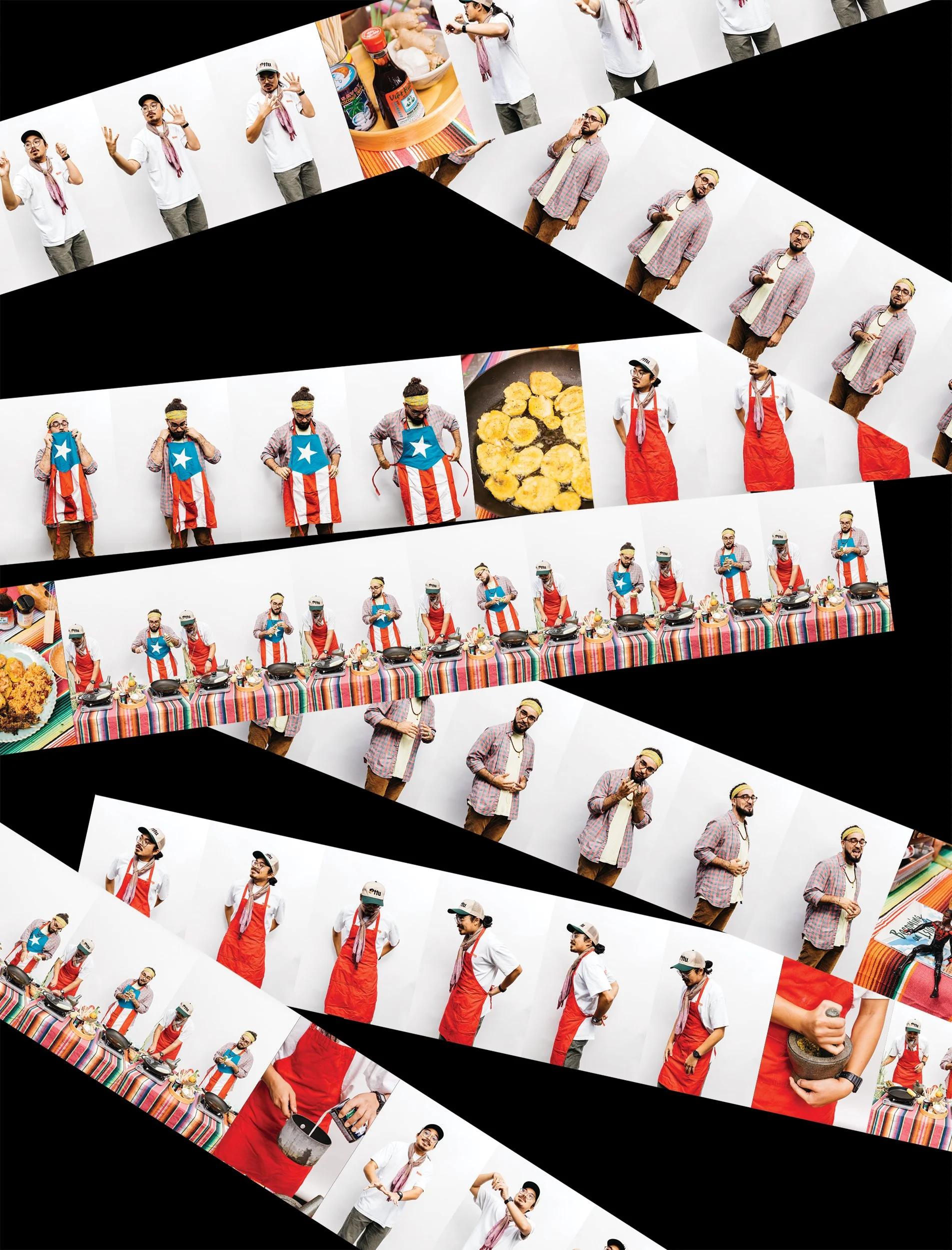Feeding Your Feelings: Adobo-Fish-Sauce Welcomes You Home
Photos by Michael Piazza
Beef skewers marinate in a bright ochre paste on the table. There’s a rhythmic chopping, then a hiss as the meat hits the pan. The aroma fills the room: lemongrass, lime, garlic, ginger, shallots, turmeric. “Y’all are here, y’all are sitting in our kitchen or in our living room, we’re building a home together, be comfortable.”
Home could be a gallery, an auditorium, a park. Anthony Febo and Ricky Orng are cooking on stage, but the audience won’t walk away with a new recipe or technique. The dishes they make when performing as Adobo-Fish-Sauce come from their own families’ cultures, but folks aren’t there to learn about Puerto Rican or Khmer cuisine. Febo and Orng are poets, and the food is a tool to encourage vulnerability and explore identity. The moment is art.
As a kid in Lowell, Anthony Febo “fell in love with the art form of storytelling through rhymes, through hip-hop.” In his junior year of high school, his English teacher talked him into attending a poetry competition for extra credit. “I was, like, ‘Man, what do I need poetry for? I rap.’” But in poetry he found something missing from the rap scene: “They were actually there to listen.” Where rap battles were about one-upmanship, the poetry scene was about building community. “That’s what I wanted to be doing. Once I learned about slam, that’s when we started to make things happen. Then, Ricky came along right around the same time.”
Like Febo, Orng loved words and writing from an early age. He followed a crush into an after-school poetry workshop and found “a room full of people with interesting stories and different backgrounds, but all have the same passion for writing. That’s the reason that I stayed and I am still there.”
Lowell has long been one of the most diverse cities in the state, a community enriched by waves of immigration from Europe and Canada, Southeast Asia and Latin America. Native son Jack Kerouac grew up speaking joual, a Canadian dialect of French, and went on to pioneer a poetry movement that blurred boundaries and embraced spontaneity. Slam and spoken word share a looseness with Beat poetry; they all use free verse to comment on personal and social issues. Open mic night at Brew’d Awakening, the “very tight, cozy, steamy coffee shop” in downtown Lowell, welcomed all kinds of performance, but spoken word poetry found a special home there. Orng and Febo became close friends in that scene—both worked as hosts, creators and mentors, teaching artists and educators, their paths happily entwined over the years.
In 2017, Orng shared a poem “where he used brunch as a metaphor for the in-between of a relationship” that stuck with Febo. Not long afterward on a train, a man shouted at him to speak English while he gave directions to Spanish-speaking tourists. He wrote about the experience and found himself wanting to cook— to reclaim and celebrate his culture by practicing it. “There’s something really beautiful that happens in turning to food as a source of healing, the same way that we turn to poetry as a source of healing.”
Febo called Orng with a vague notion: What if we combined poetry and food? The pair always knew they wanted to collaborate. Food and poetry, they realized, have a natural affinity. “I think the way metaphor in poetry widens the door for the audience to come in and have a better understanding of what the author is trying to say, food does that,” says Febo. They got some hot plates, did a few house shows, created a video reel and submitted it to colleges across the country. Soon Adobo-Fish-Sauce was on tour.
As partner one cooks onstage, the other speaks—the border between banter and performance often blurred until the language takes on a sudden crispness. “If I never moved from Puerto Rico, would my skin be tostones brown?” Like the best duos in any form—music, dance, comedy—their chemistry is riveting. There’s palpable ease between the friends that invites viewers in and says: You can sit with us.
One of Orng’s poems starts conversationally, a story of how his mother owned a donut shop while pregnant with him. She would joke that she planned to name the baby after a donut. As he lists the flavors, glazed, fresh cruller, jelly boy, the audience finds itself inside a poem, a bit more air around each word. “My name was deep fried and tossed into something sweet so American folk could chew on it easy.… My name is a proud mistake. My name... is a donut.” Stories of vulnerability and hurt are tempered with humor and joy.
As Febo prepares tostones, the audience follows each step—chopping the plantains, seasoning them in adobo, frying them, smashing them in the tostonera, refrying them and making the sauce. The physicality of the performance, the chopping and sizzling, gives audiences something familiar to look at and listen to, putting them at ease and allowing them to let go of “preconceived notions of what poetry should be. Or, there is an accepting of the feelings that the poetry is bringing up because they’re also opening themselves up to this multisensory experience.”
Food bridges the gap between high and low, poetry and performance, creating space for vulnerability. In a gallery-based performance, they cooked Cambodian Butter Pan in collaboration with their guests, dipping vegetables and proteins in a sweet, sour, spicy fish sauce and adding them to the hotplate in a “forever dance.”
The work isn’t about where the food comes from, but where it is in the present moment. “I don’t think I’m intentionally trying to do a traditional Khmer dish,” says Orng, “but I am interested in doing a dish that reminds me of what my mother made, or what my father makes. I think that’s dope because I’m pretty sure they did their own spin on it for whatever reason, whether it’s through taste or circumstance.… A lot of the foods, I don’t know what the ingredients are called; either I don’t know them in English but I know them in Khmer, or I don’t know either so I go off the visuals.” Cooking the dishes explores “the transfer of knowledge specifically within my family, but also the transfer of knowledge that happened in their migration to this country as refugees. I remind myself how old my parents were when they got here, how much they left behind and how much they chose to take with them.”
Febo moved back and forth between Lowell and Puerto Rico as a kid. “There was always that feeling,” he says, “like, Puerto Rico was home as much as Lowell is home, and needing to reconcile that within my own body.” The theme of home is ever-present in their performances.
“You can find home on the basketball court. You could find home in fellowship with someone. I think the same way that we, in our workshops, try to convey that poetry is so much more than just the written word, that home is a lot more than just where you come from. Today, tonight, together we created a little mini home for all of us together. We all feel changed and a little bit more open and vulnerable than when we first came in.”
Whether or not the audience is familiar with pot ang or bocadillos, food is universal. Everyone eats. In the work, Adobo-Fish-Sauce discusses personal experiences of adversity and heartbreak. “Where our families come from is inherently a part of who we are, the work that we do and the food that we make,” says Orng. “It's just all part of our DNA that has those generations of story embedded in it. Using food as this art form, I think, includes all those aspects.”
“I think about the kid in middle school that opens up their lunch box and their mom or caretaker packed something for them that was culturally specific and the kid next to them being, like, ‘Ew, what’s that?’” says Febo. “By bringing in culturally specific foods or talking about them in the stories or in our banter, we are normalizing them in a way that says ‘this dish belongs here as much as a hamburger does, as much as a slice of pizza does.’ These are part of the tapestry of who we are; to deny it space is denying space for ourselves as well.”
The pandemic posed some specific challenges for a form so rooted in the senses, reliant on audience collaboration and being in physical space together. In addition to taste and smell, movement and physicality are central to the work, especially with youth. After a busy 2019 that included a Boston Center for the Arts residency and series of youth workshops at the ICA, they found ways to connect with audiences virtually. In a series of Zoom workshops during lockdown, they spoke to each other and 10 empty squares with names—shy teens with their cameras turned off. They distributed gift cards so participants could order food and eat together. “It’s an interesting moment trying to get 10 or 12 high schoolers to all have their Uber Eats arrive at the same time so that we could eat at the same time,” says Febo.
In fall 2021, they hosted a grant-funded outdoor series called “In the Park,” where they asked guests to bring their own lunch to eat together. In a poem called Five Bites, guests are asked to “Take a bite, chew only on your left side. What is something in your life that feels out of balance? You’re chewing, you’re doing a little bit of writing, boom. We do that for the five bites, we give folks time to do some writing. Then we have a little open mic afterwards and take some of the artifacts [sandwich bags, foil wrappers, apple stickers] off of our food and create a bit of an altar to honor the moment.”
Even without the hotplates, food opens doors to connection, fostering “an exchange with the folks that we are sharing space with. Living intentionally and being mindful in the moment, being able to find the beauty or the poetry in everything, to be able to capture it and understand its value. Whether it’s just writing or sharing out loud, how the food tastes, all of those things… being together as if we were all homies,” says Orng. “We hope folks can have a laugh and have a cry, and maybe at the end of the show, have a bite.”
This story appeared in the Winter 2022 issue.



